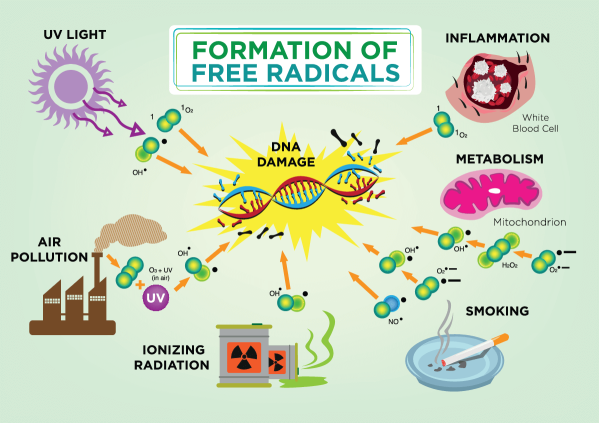Understanding Free Radicals and Their Impact on Your SkinFree radicals are unstable molecules with an unpaired electron. This makes them highly reactive, constantly seeking to steal an electron from other molecules to stabilize themselves. This "electron theft" is called oxidation, and it's a major contributor to cellular damage. While some free radical production is natural and even necessary for certain bodily functions (like fighting off infections), an overabundance can lead to significant problems, especially for your skin. How Free Radicals Damage SkinThe constant barrage of free radicals from both internal and external sources overwhelms the skin's natural antioxidant defenses. This leads to a chain reaction of damage, manifesting in several ways: - Oxidative Stress: The imbalance between free radical production and antioxidant defenses causes oxidative stress. This is the underlying cause of many skin problems.
- Premature Aging: Free radicals attack collagen and elastin, the proteins responsible for skin's firmness and elasticity. This leads to wrinkles, sagging, and loss of skin tone. They also damage the skin's support structure, leading to a loss of volume and a thinner, more fragile appearance.
- Hyperpigmentation: Free radicals can trigger increased melanin production, resulting in age spots, sunspots, and uneven skin tone.
- Inflammation: Free radical damage contributes to inflammation, a key player in various skin conditions like acne, rosacea, and eczema.
- Increased Sensitivity: Damaged skin becomes more sensitive and prone to irritation.
- Weakened Skin Barrier: The skin's protective barrier can be compromised, making it more vulnerable to environmental stressors and infections.

Sources of Free RadicalsFree radicals come from both internal and external sources: - Internal Sources: Metabolic processes, inflammation, and stress all generate free radicals.
- External Sources: The most significant external source is UV radiation from the sun. Other culprits include pollution, smoking, and poor diet.
Protecting Your Skin from Free Radical DamageProtecting your skin from free radical damage is crucial for maintaining its health and youthful appearance. Strategies include: - Sun Protection: Consistent use of broad-spectrum sunscreen with an SPF of 30 or higher is paramount.
- Antioxidant-Rich Diet: Consume plenty of fruits, vegetables, and foods rich in vitamins C and E, and other antioxidants.
- Lifestyle Choices: Minimize stress, avoid smoking, and manage underlying health conditions that contribute to inflammation.
- Topical Antioxidants: Use skincare products containing antioxidants like vitamin C, vitamin E, green tea extract, and ferulic acid to neutralize free radicals.
Tags: Acuzine Anti Aging Antioxidants Beauty Tips Free Radicals Healthy Skin Oxidative Stress Skin Damage Skincare  
|  1,302
1,302  0
0  0
0  3350
3350 